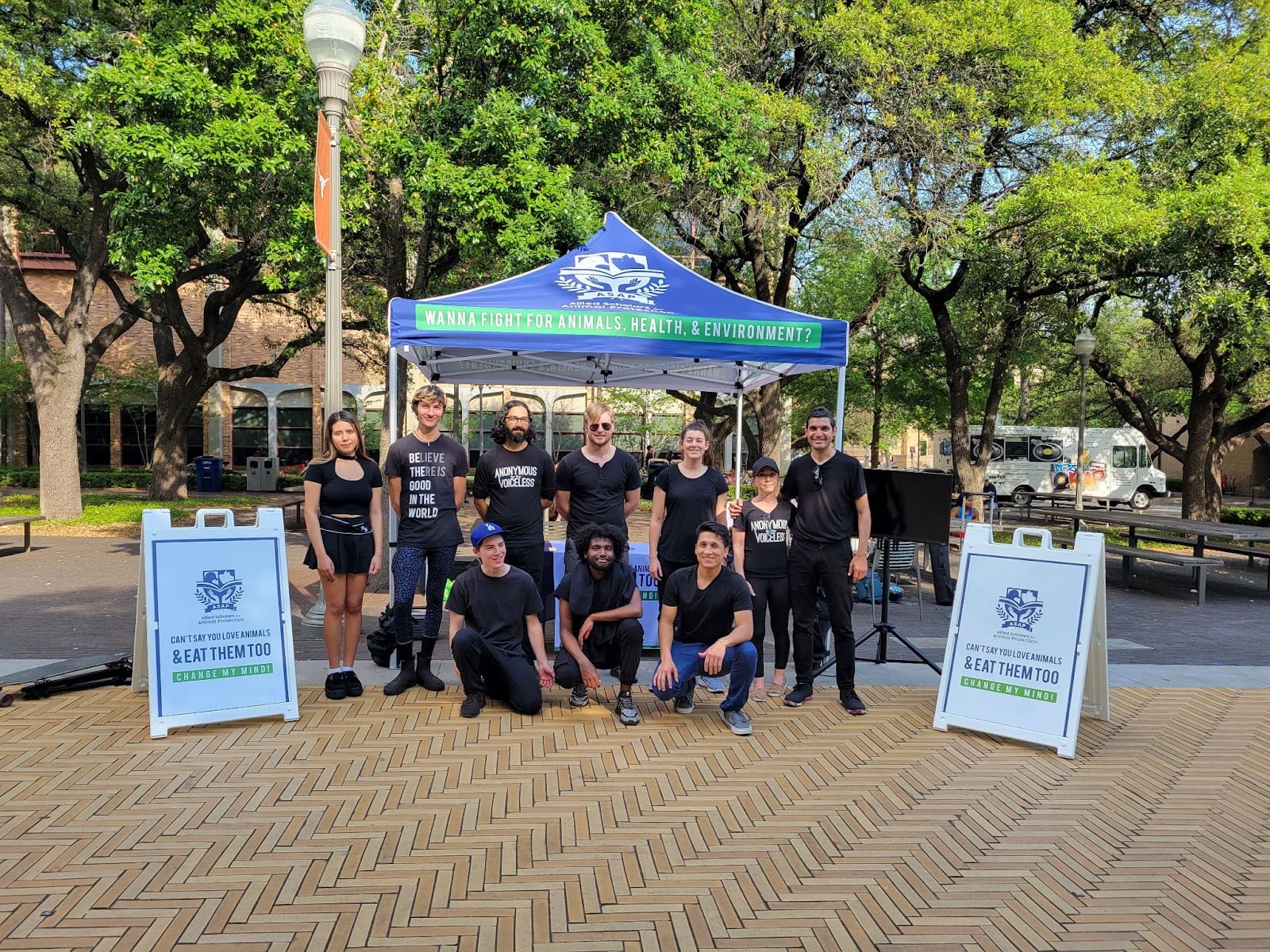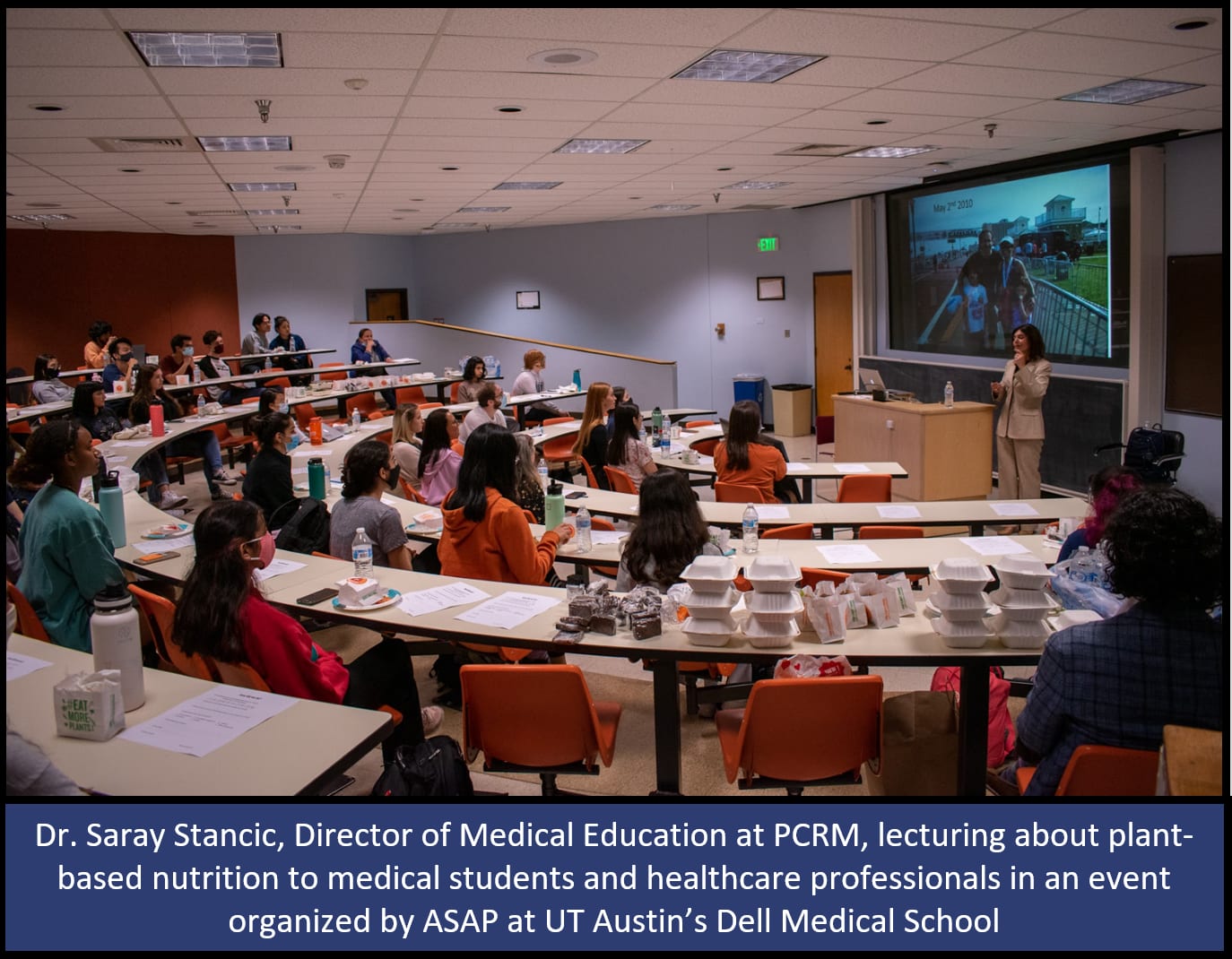Introducing Allied Scholars for Animal Protection
We’re excited to introduce Allied Scholars for Animal Protection, a nonprofit creating a unified infrastructure for effective and sustainable animal advocacy at universities. Our mission is to organize, train, and mentor students who are interested in advocating for animal welfare and pursuing impactful careers.
The Problem
Universities play a critical role in shaping the future of society and effecting systemic change. As future leaders, college students hold immense potential for driving progress and cultural transformation.
Unfortunately, animal advocacy in universities tends to be limited, sporadic, and unsustainable. The existing clubs on campuses operate independently with no coordination, and students are often hindered by a lack of time, training, experience, and support. Often, when active students graduate, their animal advocacy clubs become inactive. Much time and effort are wasted due to a lack of continuity and longevity of animal advocacy on campuses because students have to reinvent the proverbial wheel each time they restart a group.
One of the worst consequences of this is that much talent goes untapped due to insufficient education and inspiration for vegans to choose effective and impactful careers. The EA Community is working hard to reach this talent through career advising and community building. We believe that on-the-ground support for university animal rights clubs can complement EA recruitment efforts and can encourage vegan college students to engage with critical intellectual work being done by the EA community. We also think that community building work focused specifically on animal advocacy can help reach vegans who might not be as interested in other cause areas or the broader EA project.
Some animal advocacy organizations provide opportunities for students to volunteer, but enabling a strong campus movement is not the sole focus of these organizations. Having a single organization dedicated to providing infrastructure for campus activism would therefore fill a highly neglected niche in the current animal advocacy ecosystem.
Building a strong campus animal advocacy movement is also highly tractable. There are many vegan students out there who care deeply about these issues but do not feel they have the knowledge or resources to organize a group of their own. By providing the needed support, we can dramatically lower the barrier of entry to vegan advocacy and broaden the pool of talent going towards highly impactful careers.
Our Approach
Animal organizations often focus on training individual students rather than on building a sustainable vegan community. ASAP takes a more holistic approach. Our strategy for constructing a strong campus animal movement involves the following:
Building a growing vegan community while investing in and strengthening individuals. This means conducting outreach to vegans who might like to become more active as advocates, and training vegans to conduct effective outreach to nonvegans.
Providing on-the-ground support to student groups.
Collecting thousands of signatures through petitions.
Streamlining the process of starting and running student animal advocacy groups.
Facilitating systemic and long-term educational frameworks, rather than just one-time events. We will provide educational seminars to empower vegans and educate the general student population, with a special emphasis on plant-based nutrition for future healthcare professionals.
Fighting speciesism and humane-washing while promoting plant-based options.
By facilitating more effective student advocacy, we believe ASAP can help produce more influential vegans who push for change. We want to inspire the next Eric Adams, Cory Booker, Dr. Kim Williams, or Wayne Hsiung!
Case Study
The Federalist Society is a highly influential student and advocacy organization that promotes limited government and an originalist approach to interpreting the law. Founded in 1982, the group has grown to include 60,000 members, including lawyers, law students, and scholars.
With chapters in over 200 schools, even in the most liberal law schools, the Federalist Society is often the most active student group in law schools. They have a consistent and sustainable message, and a reputation for being well-organized and having a systematic and strong presence on campuses of all good universities.
Their influence is evident in the fact that six out of nine Supreme Court Justices and over 200 federal judges are affiliated with the Federalist Society.
They accomplish all of this with only $27 million in revenue.
Our vision is to be a similarly effective incubator for animal rights and vegans on college and university campuses.
What we’re working on now
We have registered ASAP chapters at the University of Texas at Austin and Texas Tech University.
We currently mentor students at UC Berkeley, the University of Arizona, George Washington University, Brown University, MIT, Harvard University, Texas A&M, Columbia University, University of Wisconsin-Madison, University of Chicago, and Indian Institutes of Technology. We are in the process of registering official ASAP chapters in some of these universities for Fall 2023.
We maintain a consistent presence on these campuses through outreach events, social media ads, and promotions.
We partner with the Physicians Committee for Responsible Medicine to organize lectures on plant-based nutrition. These efforts have been met with positive feedback according to postmortem surveys.
We are successfully running dining-related petitions signed by both vegan and nonvegan students.
We are securing monthly meetings between students and dining staff to follow up on the progress of vegan options in dining halls.
We also encourage our students to pursue impactful, animal-oriented careers. Students we work with have chosen to pursue engineering for cultivated meat, marketing in the service of the animal rights movement, and lifestyle medicine to promote plant-based living. Dr. Harsini has presented to student Effective Altruism groups at UT Austin, Columbia, and MIT in order to facilitate discussions on animal-oriented career paths.
Our Goals
Short-term goal (1 to 5 years): Establish chapters at the top 100 universities in the US, reaching over 2 million students annually.
Our medium-term goal (5-10 years): Expand to the top 200 universities and establish chapters internationally. We will also work towards introducing consistent plant-based nutrition education in medical schools and promoting primarily vegan dining options in universities.
Long-term goal (10-25 years): Have ASAP students in leadership positions influencing culture, science, medicine, politics, and education, while establishing ever-growing effective animal activism in universities around the world.
ASAP was founded in 2022 by Dr. Faraz Harsini, a biomedical scientist, engineer, and animal rights activist with over 15 years of experience in research and 10 years of experience in animal advocacy.
ASAP’s other board members include Daraius Dubash, MEM, MBA, who serves as ASAP’s CFO/Treasurer with a strong background in business, finance, and marketing, and Sonny Rodriguez who also maintains a position at Forward Food division of the HSUS, with extensive experience in working with dining services and universities.
Our team has a diverse background in environmental sciences, medicine and nutrition, litigation and legal work, campus outreach, nonprofit organization and management, and animal rights activism.
How you can help
Are you a college student who’s involved in animal advocacy or interested in getting more involved? If so, we’d love to hear from you. We are looking to work with existing university animal rights groups and to help students start new ASAP chapters. We are also interested in working with campus EA groups on helping students think about how they can have the most impact for animals.
Currently, we are very focused on growing our team and scaling our work. If you think our work sounds impactful, please consider donating or volunteering with us.


Excited and grateful for your work!!!!
Thanks Alene! I’m honored that you’re a part of our team!
Cool initiative!
In the Netherlands, there is an umbrella organization for vegan student associations: https://www.vsanetherlands.nl/ Perhaps, it could be interesting to exchange experience?
Thanks for mentioning this! Looks like a great organization with a very similar mission to ours. Will keep them in mind and potentially reach out.
Massive applause for kickstarting Allied Scholars for Animals! You’re making waves in an area that, honestly, has been overlooked for quite some time.
In my college years, student groups and support for college activists were everywhere! I was so supported and motivated by THL’s involvement in my college club and cage-free egg campaign. Over the years, it feels like we’ve strayed from that path. (THL discontinued their campus outreach program in 2020).
Universities are crammed full of motivated, bright minds ready to make a change, so it’s a missed opportunity not to tap into that resource. It’s refreshing to see you recognizing this and taking charge to mobilize these potential change-makers.
Thanks for stepping up and best of luck with this endeavor. I’m sure we’re going to see some incredible work coming from this initiative!
Thank you very much Constance! I was a PETA camp rep and I had my friend to apply for THL student rep program. But even those programs where not focused on building a sustainable community and were mostly focused on training individuals or supporting certain campaigns!
We want to not only support individuals, but also build a sustainable community and infrastructure! This current trend, where student orgs come and go every 2-3 years, and each student org is doing a different thing, is not effective and doesn’t work, yet as you mentioned, there’s tremendous potential in universities. People whom if we invest on, can change the system!
Thanks again for the kind words!